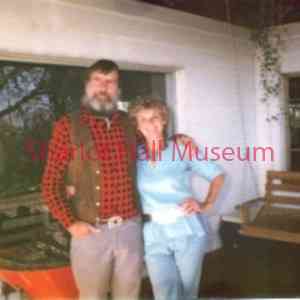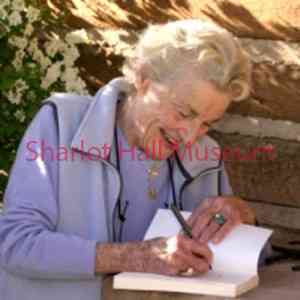By Susan Cypert
The last song Katie Lee sang in Music Temple in Glen Canyon in 1962 was a spiritual she learned called “They Crucified My Lord;” only she changed the words.
“They crucified my River
And he never said a mumblin’ word –
They pierced him in the side
But he never said a mumblin’ word… not a mumblin’ word
….Now wasn’t that a pity and a shame –
The way they done my River?
Not a word…not a word…not a word”
In songs, speeches and stories, Katie became one of the early environmental movement’s loudest and fiercest voices, along with people like Edward Abbey and his Monkey Wrench Gang and David Brower, Sierra Club founder. Her anger at the federal government, especially the “Wreck-the-Nation Bureau” (Bureau of Reclamation) fueled her music and made her a magnet for filmmakers. Many people know Katie Lee from her cameo appearance in the documentary DamNation, where she shared photos from her last trip through Glen Canyon.
 There was also a picture of her for a river guide’s magazine with her arms folded across her chest, a monkey wrench in one hand and a stick of dynamite in the other. According to the New York Times, she said the only impediment to her blowing up the dam was that she didn’t know how.
There was also a picture of her for a river guide’s magazine with her arms folded across her chest, a monkey wrench in one hand and a stick of dynamite in the other. According to the New York Times, she said the only impediment to her blowing up the dam was that she didn’t know how.
Katie wrote three books about the canyon; Sandstone Seduction, The Ghosts of Dandy Crossing and All My Rivers Are Gone (later republished as Glen Canyon Betrayed: A Sensuous Elegy). She sang countless songs of longing for the place and testified, rallied, petitioned and inspired many, especially the younger generation. She was a board member of the Glen Canyon Institute, a non-profit group dedicated to removing the dam. When the 1999 Tucson Weekly article was published, David Wegner, then vice president of the Glen Canyon Institute and former biologist with the Reclamation Bureau, worried about the damage the dam had done to the Grand Canyon, trapping sediment so no nutrients flowed downstream and water so icy cold that two species of native fish vanished. He also contended the dam was a failure for water storage, its primary purpose.
Proponents said it would be equally foolish to tear down the dam, as it would mean the demise of the city of Page and the end of a lucrative tourism industry in the area.
After her beloved canyon was drowned, Katie left Arizona for seven years, returning to settle first in Sedona and then Jerome in 1971. She began writing books again. Her next book, Ten Thousand Goddam Cattle, is a history of the cowboy in song and verse. Along with the book, she produced a television documentary called The Last Wagon about the lives of Arizona cowboys Gail Gardner and Billy Simon, which won the 1972 Cline Golden Eagle award.
 In between, she wrote The Ballad of Gutless Ditch, Maude, Billy & Mr. D – A Folk Opera and spent much of her time making appearances, reading passages from her books and stoking “the flames of anti-dam sentiment.”
In between, she wrote The Ballad of Gutless Ditch, Maude, Billy & Mr. D – A Folk Opera and spent much of her time making appearances, reading passages from her books and stoking “the flames of anti-dam sentiment.”
In 2014, she received Telluride’s Mountainfilm Festival Director’s Award, and in 2016 (again at the Mountainfilm Festival), Peter McLaughlin, Tim Weidenkeller and Katie Lee performed an original song after the showing of Gage and Gage Production’s biographical film “Kickass Katie Lee,” called “She Knows the River” written by Peter for Katie. She was also inducted into the River Runners Hall of Fame.
“…if they’re taking away things from you that you adore and love, it’s gonna make you mad. And it sure as hell made me mad. Made me mad enough to get off my ass and go to work.”
The last years of her remarkable life were spent in Jerome writing for her Katydid Books and Music. Kickass Katie passed away in her sleep at 98 on November 1, 2017.
“Days Past” is a collaborative project of the Sharlot Hall Museum and the Prescott Corral of Westerners International (www.prescottcorral.org). This and other Days Past articles are also available at https://www.sharlot.org/articles/days-past-articles.l. The public is encouraged to submit proposed articles and inquiries to dayspast@sharlothallmuseum.org. Please contact SHM Library & Archives reference desk at 928-445-3122 Ext. 2, or via email at archivesrequest@sharlothallmuseum.org for information or assistance with photo requests.


